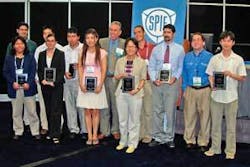AWARDS IN PHOTONICS: Newport/SPIE travel grants assist students
To assist research students with travel funds for the purpose of presenting technical papers at major industry conferences, Newport (Irvine, CA) initiated the Newport and Spectra-Physics Research Excellence Travel Awards in partnership with The International Society for Optical Engineering (SPIE; Bellingham, WA). Since the program began in 2004, The Newport grants have assisted more than 65 students from a dozen countries.
“Progress in science and engineering is not made by individuals-it takes great teams and sharing of ideas. The Newport travel grant makes it possible for outstanding students to embrace the community spirit of science and engineering at SPIE meetings, and to meet and learn from a wide range of professionals,” says Sandra Biedron, chair of the 2006 SPIE Scholarships and Grants Committee and Director of the Office of Naval Research Projects at Argonne National Laboratory (near Chicago, IL).
The travel awards program was initiated in mid-2004 with a $10,000 grant from Newport for use at the two major SPIE conferences, Photonics West and Optics and Photonics. Newport increased the grant to $15,000 in 2006. At the 2006 Optics and Photonics Conference (Aug. 13-17; San Diego, CA; see www.laserfocusworld.com/articles/272023), this year’s winning students were honored in a short ceremony and received plaques from Gary Spiegel, Newport’s vice president of worldwide sales and service, and Jason Eichenholz, Newport’s director of strategic marketing for the scientific research market.
Because SPIE already offered the Student Travel Contingency Grants program (funded by SPIE at $30,000 annually), it worked well to add the Newport sponsorship funds into the existing program, bringing the total grant awards to $45,000 annually in 2006.
Criteria for selection for the SPIE and Newport grants are the same: applicants must be full-time students who are not also full-time employees in industry, government, or academia; they must be presenting an accepted paper at an SPIE-sponsored meeting, have one letter of recommendation from a department head or advisor, and have written support (a letter or e-mail) from a chair of the conference in which the paper will be presented, indicating that the paper presentation is necessary to the conference’s success.
To apply for an award, students must submit a travel-contingency application form (available at www.spie.org/communityServices/StudentsAndEducators/pdfs/Student_Travel_Application.pdf) detailing their need no later than 10 weeks prior to the first day of the SPIE symposium to which they wish to travel.
The travel award judges are the conference chairs; they must indicate in writing that the paper is a strong one and the student is therefore worthy of support. Nearly 200 applications for student-travel grants are received each year; students who meet all of the criteria are offered a grant ranging from $200 to $1,000.
About the Author

Gail Overton
Senior Editor (2004-2020)
Gail has more than 30 years of engineering, marketing, product management, and editorial experience in the photonics and optical communications industry. Before joining the staff at Laser Focus World in 2004, she held many product management and product marketing roles in the fiber-optics industry, most notably at Hughes (El Segundo, CA), GTE Labs (Waltham, MA), Corning (Corning, NY), Photon Kinetics (Beaverton, OR), and Newport Corporation (Irvine, CA). During her marketing career, Gail published articles in WDM Solutions and Sensors magazine and traveled internationally to conduct product and sales training. Gail received her BS degree in physics, with an emphasis in optics, from San Diego State University in San Diego, CA in May 1986.
